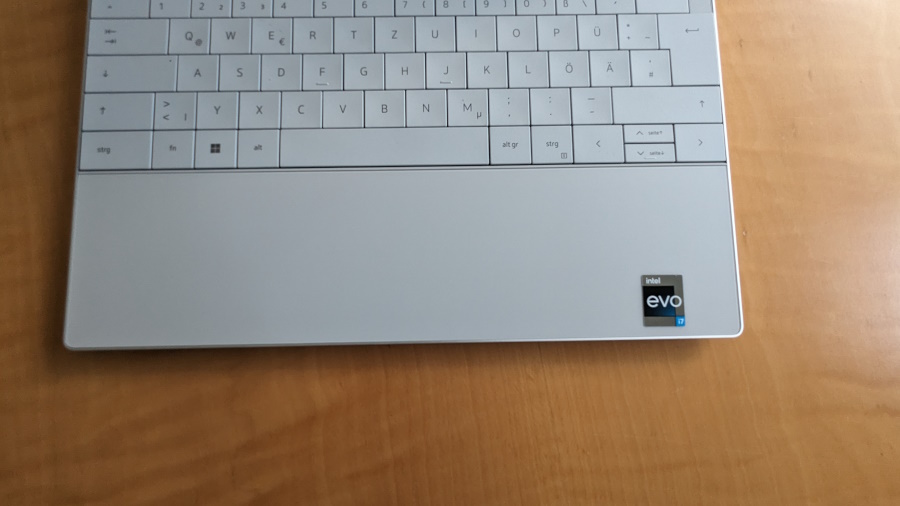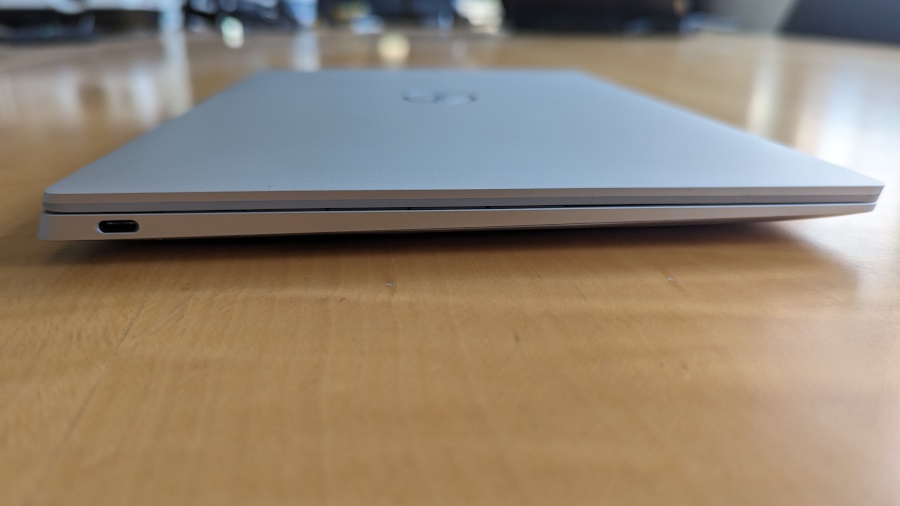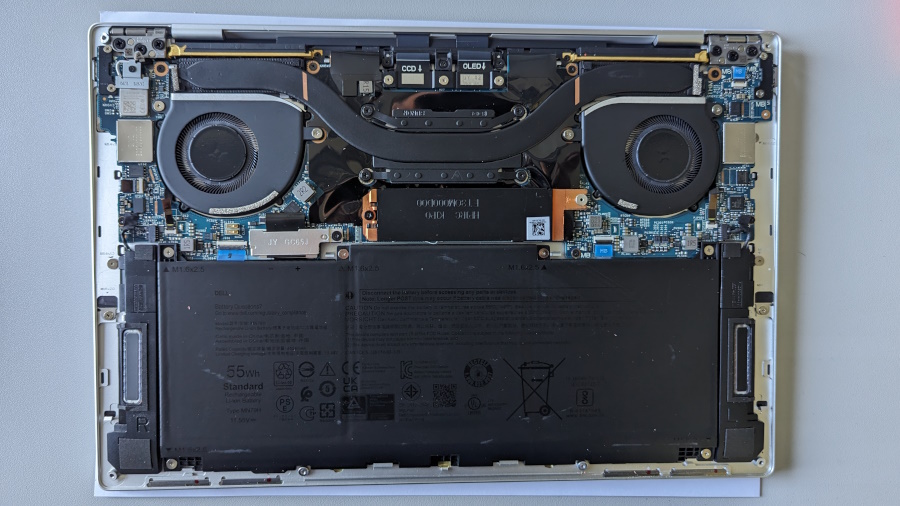Expert's Rating
Pros
- Stylish, eye-catching design
- OLED with excellent color reproduction
- Touchscreen
- High display resolution
- Decent computing power
- Quiet, even under load
Cons
- Moderate battery life
- Only two ports
- Camera only with 720p resolution
Our Verdict
If you’re looking for something special, the Dell XPS 13 Plus is for you: Its chic case and top display make it an ultrabook that is more than just a work machine for text and spreadsheets. However, the unique streamlined concept is also the sticking point, only if you can cope with it should you opt for the XPS 13. Otherwise, the touchpad frustration in office use will spoil the pleasure of the beautiful design.
For the most part, the 2023 model of the XPS 13 Plus remains largely unchanged from its futuristic predecessor. It still retains the same striking design and high resolution display. However, the latest iteration now comes with the current 12-core CPU from the Raptor Lake generation, the Intel Core i7-1360P. While we had a few caveats, namely with the lack of connectivity and the 720p webcam, there’s still a lot to love. In addition to the boost in processing power, you’re also getting a quietly run laptop with a touch-enabled display. Read on to learn more.
Looking for more options? Check out PCWorld’s roundup of the best laptops available today.
Dell XPS 13 Plus (2023) specs
| Dell XPS 13 Plus 9320 (2023): Equipment | |
| Processor | Intel Core i7-1360P |
| Clock speed | Standard clock: 2.6 GHz (P-Cores); 1.6 GHz (E-Cores); Turbo clock up to 5.0 GHz (P-Cores); 3.7 GHz (E-Cores) |
| Cores / Threads | 12 / 16 (4 P-cores + 8 E-cores) |
| RAM | 32 GB LPDDR5-5200 (not exchangeable) |
| Graphics card | Intel Iris Xe (integrated in CPU) |
| Drive | NVMe SSD Samsung PM9A1 (PCIe 4.0 x 4) |
| Usable capacity | 953 GB |
| Format | M.2 2280 |
| Network: LAN / Wi-Fi / Bluetooth / Mobile | – / WiFi-6E (Intel AX211) / 5.3 / – |
| Operating system | Windows 11 Pro |
| Display: Diagonal / Resolution / Format | 13.4 inch / 3456 x 2160 / 16:10 |
| Dot density / refresh rate | 304 ppi / 60 Hz |
| Weight: Notebook (with battery) / power supply unit | 1282 / 258 grams |
| Battery: Capacity | 55 Wh |
| Connectors right | 1x Type-C Thunderbolt 4 |
| Connectors left | 1x Type-C Thunderbolt 4 |
| Further features | Camera (720p) with Windows Hello, finger sensor |
Dell XPS 13 Plus (2023): Trackpad and keyboard
Using the invisible haptic touchpad takes a lot of getting used to. In fact, we couldn’t get used to it in the testing period. It’s hard to move the mouse pointer over longer distances because you never know where the touchpad begins and ends.
The haptic feedback on a mouse click also seems too slow and too hard. You always have the feeling that you have to press harder to trigger a reaction, although the input field does not move at all, but acknowledges the finger pressure with a vibration.
So it’s better to trigger a mouse click with a short finger tap. In our test device, the touchpad didn’t react reliably. The mouse pointer sometimes stops when your finger continues to move over the touchpad surface, or the touchpad only reacts to a gesture with a delay.
The keyboard, which takes up the entire width of the case, is more comfortable. Its keys are larger than those of other ultrabooks because they are directly next to each other. This makes typing fast and accurate. Only the arrow keys, which are not offset, are annoying to deal with. In bright ambient light, however, the dark grey lettering on the light grey keys is barely visible, even when the keyboard backlight is activated. You should only use it in poor lighting conditions.

Thomas Rau
Dell also places a bar with touch keys above the keyboard, which you can use to control the volume and brightness, for example, but also to trigger functions like Esc and Remove. As with the entire concept around this futuristic laptop, it has to be acknowledged that this element looks strikingly different, though an ergonomic advantage cannot be discerned.
From the outside, the XPS 13 Plus takes cues from the classic Dell design. The aluminium case is wrapped in elegant silver. It’s also angular with rounded corners and can be opened comfortably with one hand. You have to catch the lid with your fingers, as it does not offer a handy protrusion for lifting.
The lower plastic casing cover can be removed by unscrewing six screws. Only the SSD can be replaced, as the RAM and Wi-Fi module are soldered.

Thomas Rau
Dell XPS 13 Plus (2023): Perfect color reproduction thanks to OLED
Dell offers the XPS 13 Plus with three display variants. Our review unit has an OLED screen with 3.5K resolution, while the display with UHD+ offers even more pixels. The cheaper models come with 1080p resolution. This display can also be ordered without touch function, the high resolution screens are always touchscreens.
The screen in Dell’s ultrabook also proves its OLED strengths. It’s very strong in terms of color reproduction and contrast and, thanks to the very high dot density of 304 pixels-per-inch, shows many details and scales fonts very cleanly. In addition, the screen surface is very evenly illuminated. Only the brightness of the OLED is not outstanding, even compared to other OLED screens.
The OLED version of the XPS Plus 13 is worthwhile if you often have to deal with graphics and photos in office work or simply want a lightweight notebook with an outstanding display.

Thomas Rau
Dell XPS 13 Plus (2023): The 12-core is enough for (almost) everything
If you’re constantly handling digital multimedia content, the XPS 13 Plus is less suitable. As a work machine for creators, it lacks computing power.
But for office use, the Core i7 is fully sufficient, especially since it is supported by a fast Samsung SSD. The Dell XPS 13 Plus also handles most demanding tasks quickly and smoothly. Only when particularly high CPU and graphics performance is required, such as when rendering or editing high-resolution videos and photos, can it not keep up with a notebook with a Raptor-Lake H(X) or an Nvidia GPU.
Its compact dimensions also limit the Dell XPS 13 Plus when high computing power is required over a longer period of time. The Core i7-1360P can work at a higher clock rate for longer in a 16-inch laptop, which is why the Dell notebook scores up to 20 percent worse in the CPU test Cinebench R23 with just under 7,700 points, for example.
| Dell XPS 13 Plus 9320 (2023): Test results | |
| Speed with office programs | 84 points (out of 100) |
| Speed with multimedia programs | 58 points (out of 100) |
| Performance 3DMark | 34 points (out of 100) |
| Display: brightness / brightness distribution / contrast | 372 / 97% / infinity |
| Anti-reflective display | no |
| Display: Color space coverage (in percent) | sRGB: 100 / Adobe-RGB: 100 / DCI-P3: 98 |
| Display: color fidelity (deviation Delta-E) | 1,71 |
| Battery life (hours:minutes): Wi-Fi test | 09:41 |
| Battery capacity after 1 hour of charging | 84 per cent |
| Operating noise under load | 40 dB(A) |
| Temperature top side / bottom side | 36 / 41° Celsius |
Even compared to a Core i7 from the frugal U-series with only ten cores, which sits in a 15- or 16-inch notebook, the XPS Plus 13 can barely set itself apart in Cinebench. However, the fans in the Dell notebook are much quieter with a maximum of 40 dB(A) — especially compared to the Kreator notebooks. Nevertheless, they efficiently transport the waste heat out of the case, which does not heat up noticeably at any point.
Compared to the predecessor with a Core i7-1260P (Alder Lake), the current XPS 13 Plus works around ten percent faster, as the Raptor Lake CPU achieves higher clock rates with the same power consumption.
Dell XPS 13 Plus (2023): A lightweight travel companion
The Dell XPS 13 Plus is compact, flat and, at just under three pounds, not heavy. Even the small power supply hardly takes up any space in a backpack or bag. However, if you travel a lot and really have to pay attention to every gram of your notebook, you’ll find even lighter alternatives in the HP Elite Dragonfly and the Lenovo Thinkpad X1 Carbon.
The battery lasted just under ten hours on a single charge, which is a solid but not phenomenal result. The high display resolution and the processor from the P-series instead of the more economical U-series pull on the battery, so that the XPS 13 Plus treats itself to about one watt more in battery mode than notebooks without these features.
Dell XPS 13 Plus (2023): Streamlined ports
As with the handling, the XPS 13 Plus puts form before function when it comes to features. There are only two small ports on the case. These are two flexible Thunderbolt 4 ports that also serve for charging, meaning at least one is frequently occupied. Most users will probably not be able to avoid a docking station or adapters due to this scarce connection equipment. Dell includes an adapter for Type A USB as well as one with a mini-jack connection because the notebook does not have an audio jack, either.
The biometric login is more flexible. The XPS 13 Plus has a finger sensor in the power button at the top right and the camera supports facial recognition. However, its video resolution is only 720p.
Bottom line
All in all, this newer version of the Dell XPS Plus mirrors its predecessor. If you’re looking for something special, the Dell XPS 13 Plus is for you: Its chic case and top display make it an ultrabook that’s much more than just a ho-hum work machine. However, the unique streamlined concept is also the sticking point, and you should only opt for the laptop if you can cope with it. Otherwise, the touchpad frustration in office use and limited port selection may spoil the pleasure of the beautiful design.
This article was translated from German to English and originally appeared on pcwelt.de.
